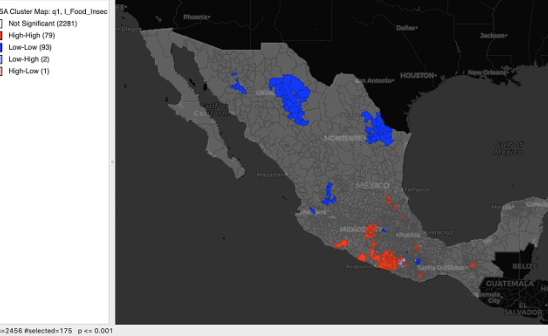Irene Farah Presents at WRSA 58th Annual Meeting

Irene Farah, Associate Researcher at the Center for Spatial Data Science, will present her paper on Mexico's food insecurity at Western Regional Science Association 58th Annual Meeting (February 10–13, 2019).
Food policy in Mexico has focused primarily on amending short-term and proximal causes of food insecurity to ameliorate hunger. Even though the definition of food insecurity encompasses availability, access, utilization, and stability; researchers and policymakers have chiefly focused on availability. Mexico’s extant inequalities across regions and populations reinforce the relevance of using a geospatial methodology in order to assess spatial spillovers in a heterogeneous context.
Hot spots of food insecurity persistently appear on the coastal-southern region of Mexico using LISAs. High-low spatial outliers are in regions with high percentages of indigenous people. Low-high outliers encompass bigger cities which attract greater infrastructure, surrounded by rural areas with greater shortages of food.
The main purpose of this study is to measure the spatial effects of macro level, distal factors and their impact on food insecurity. The results of spatial regression models show that lack of basic services (water, electricity, and drainage) has the greatest effect on food insecurity levels. In particular, deprivation of basic infrastructure has mostly affected the rural, indigenous populations of Mexico’s south-costal region.
See full WRSA 58th Annual Meeting program here.
(Originally Published on 01-31-2019)
 THE UNIVERSITY OF CHICAGO
THE UNIVERSITY OF CHICAGO

